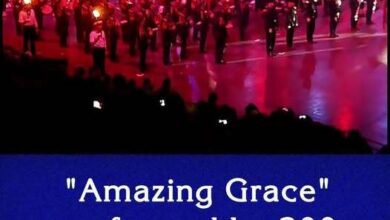Priscilla Says This Is The Song Where Elvis Pours His Heart Into Every Note.
“If I Can Dream” is widely regarded as one of Elvis Presley’s most stirring and significant performances. Recorded on June 23, 1968, for his acclaimed “Comeback Special,” the song marks a pivotal moment in Presley’s career and reflects his deep engagement with the social and political issues of his time.
The song was written by Walter Earl Brown in response to the turbulent social climate of the 1960s, a period marked by significant civil rights struggles and widespread social change. Brown’s lyrics articulate a powerful vision of hope and reconciliation, addressing the yearning for a better world amidst the prevailing chaos and division. The chorus, which includes the lines, “We’re lost in a cloud, with too much rain / We’re trapped in a world that’s troubled with pain / But as long as a man has the strength to dream / He can redeem his soul and fly,” captures a poignant plea for unity and progress.
Elvis Presley’s interpretation of “If I Can Dream” is infused with a deep emotional resonance, amplified by the song’s arrangement. The performance is accompanied by a full orchestra and a gospel choir, which contribute to its grand and uplifting sound. The orchestral backdrop provides a rich, cinematic quality, while the gospel choir’s harmonies add a layer of spiritual depth. This arrangement helps to underscore the song’s message of hope and redemption, enhancing its emotional impact.
The recording of “If I Can Dream” was a significant moment in Elvis’s career. After years of focusing primarily on film soundtracks, the “Comeback Special” marked a return to live performance and showcased Elvis’s enduring talent as a vocalist and performer. The special was broadcast on NBC and received widespread acclaim, rejuvenating Presley’s career and affirming his place as a major force in the music industry.
The song’s powerful message and Elvis’s passionate delivery struck a chord with audiences, making “If I Can Dream” an anthem of the era. Its themes of hope, unity, and the possibility of a better future resonated strongly with the civil rights movement and the broader cultural climate of the late 1960s. Elvis’s performance is often remembered for its emotional intensity and its ability to convey a message of profound significance.
Despite its initial success, “If I Can Dream” did not achieve the same level of commercial success as some of Presley’s other hits, but it has endured as a significant piece of his legacy. The song has been praised for its bold and heartfelt expression of social consciousness and its contribution to the broader conversation about social justice and human potential.
Elvis’s ability to interpret and deliver such a powerful message through his music underscores his artistry and his capacity to connect with listeners on a deep emotional level. His performance of “If I Can Dream” is a testament to his skill as a vocalist and his commitment to addressing important issues through his art.
Today, “If I Can Dream” remains a poignant reminder of the potential for music to inspire change and bring people together. Its message continues to resonate with audiences around the world, reflecting Elvis’s enduring impact as an artist and his ability to address the universal themes of hope and unity. The song stands as a powerful example of how music can transcend time and speak to the ongoing struggles and aspirations of humanity.





